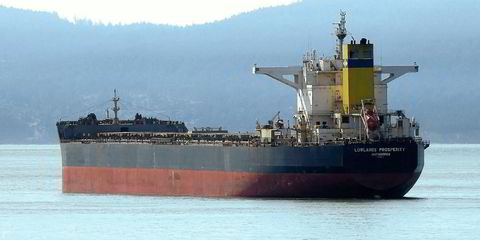Is the London shipping community tiring of their monogamous relationship with the Baltic Exchange? Not according to chief executive Mark Jackson.
When Baltic shareholders voted to accept a takeover offer from the Singapore Exchange in late 2016, it brought an end to 272 years of independence for the mutually owned exchange.
Nearly seven years later, it seems that some are dissatisfied with the relationship, like the protagonists in the 1950s film The Seven Year Itch.
None more so than shipbrokers and charterers, who formed an independent forum to unite participants in the freight derivatives market and represent their interests separately from the Baltic.
That might have been seen as a move away from the Baltic, but it is not viewed by Jackson in a negative light.
From the Baltic’s perspective, the Independent FFA Association (IFFAA) is “a great thing”, said Jackson, the Baltic’s CEO since February 2017.
“At the moment, we have the best relations we’ve had for a long time, in the sense they can see all the investment we put in is benefiting the market,” he said.
“The Baltic has always encouraged lobby groups, what you want is an independent lobby group.
“So, this one was with our complete encouragement — it means we don’t have to arrange this.”
Tighten up
Under benchmark regulation, the Baltic is obliged to have market engagement.
There are 120 non-executive members on advisory and member councils and Asian and Europe wet and dry committees “each talking their own book”, Jackson said.
“It’s a lot of work,” he added. But the fact that the forward freight agreement group were willing to do it on their own was “fantastic”, he said.
“They might come along and challenge us, to prioritise what we do, put pressure on us.”

But the Baltic has already taken steps to improve the quality of the physical indices. Jackson expects that improvement in the forward curves will be achieved too.
“We’re reliant completely on the brokers giving us those forward curves,” he conceded.
“So there’s a feedback loop in that we need them to tighten up their game. We need to tighten up our game, too. This is where the emphasis has gone.
“It is one of our main goals. So we’ll be working with the IFFAA to sort out the forward curves as well.”
Not all relationships have been patched up so easily.
Last year, the Shanghai-based China Newbuilding Price Index abandoned talks with the Baltic about possible cooperation in a new index that would expand the suite of products.
Jackson attributes the end of talks to “quality issues”.
Double-edged sword
“Everyone has big expectations of the Baltic. It’s both a blessing and a curse,” he said.
“We’re seen as being gold standard and sometimes end up with people who think they’re gold standard.”
The relationship between the Baltic and its widening base of global freight information users is dynamic.
The prospect of shipbrokers becoming so large — the so-called “Clarksonisation” of the market — does not appear a worry.
Many brokers already produce their own indices, but benchmarks are financial products that require governance, scrutiny and continuity, said Jackson.
Benchmarks may be difficult for a company to replicate in a market that occasionally faces allegations of potential market manipulation.
Business and AI
Such concerns are likely to grow with artificial intelligence and machine learning coming onto the data scene.
“How are you going to explain to a regulator that someone can’t work out how to trick the AI machine? That comes back to manipulation,” Jackson said.
“It’s going to come, absolutely. And is one of the reasons we’ve gone into containers and air cargo, as it’s a different model for us,” he added.
“It’s people dealing with big data. And we’ve been learning how to convert the way they’re doing something into something that is acceptable to a regulator.”
That may provide a whole new relationship between the Baltic and shipbrokers.
If a broker such as Clarksons sought to make something into a financial product, it would be the “calculating agent” that determines the value of the derivative
The Baltic would remain the Benchmark Administrator, or BMA, with authorisation to carry out the regulated activity of administering the benchmark.
“We’re getting into a position where we can offer these services to other markets,” said Jackson.







